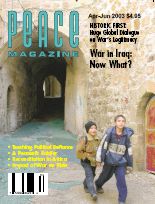
Peace Magazine Apr-Jun 2003, page 31. Some rights reserved.
Search for other articles by PMag staff here
Foreign Affairs Minister Bill Graham has invited Canadians to participate in a dialogue concerning the nation's foreign policy. The goal is to make the foreign policy represent Canadian values and interests.
Read Mr. Graham's initial discussion paper at www. foreign-policy-dialogue.ca and reply on-line.
Mordechai Vanunu is the Israeli who as an act of conscience documented the presence of illegal nuclear weapons in the Middle East in 1986. Vanunu appeared in camera before a parole committee on January 21, 2003. He spoke on his own behalf. Despite previous hints, the security establishment still opposes his release. He spent 11.5 years of his 18 year sentence in solitary confinement and will have to complete his entire term in prison. He is scheduled to be released in April, 2004.
There is little doubt that the Court's ruling, while partially an act of vindictiveness on the part of the security establishment, is mostly motivated by the Israeli government's fear that Vanunu's release at this time would inevitably lead to increased global attention to Israel's weapons of mass destruction. Israel maintains facilities for manufacturing nuclear, biological and chemical weapons, as well as a huge stockpile of nuclear weapons, yet it has not signed the Non-Proliferation Treaty and refuses to allow any independent inspection of its facilities.
Pentagon Seeks End to Ban on Development of Low Yield Nukes - Recently the US Defense Department provided the House and Senate Armed Services Committees with its proposals for legislative changes in existing law. It includes rescinding the 1994 ban on the research and development of "low-yield" nuclear weapons - those with a yield below five kilotons. Past efforts in Congress to repeal the ban have failed, although the fiscal year 2001 Defense Authorization Act included language requesting a study on the possible use of nuclear weapons to defeat hardened and deeply buried targets. The Pentagon's formal request that the ban be lifted means that some form of Congressional action on the issue is likely.
- Center for Defense Information
China's finance minister Xiang Huaicheng is proposing to slow growth in China's defense spending in the coming year. According to the government, China plans to spend $22.4 billion on the military, an increase of slightly less than ten percent from the current budget of $20.4 billion. China's official defense budget has grown dramatically over the last two years, increasing by 15 to 20% annually.
Despite these efforts by the government, China's actual military expenditures are likely considerably higher than official figures. For instance, the Stockholm International Peace Research Institute (SIPRI) put Chinese military spending at $27 billion in 2001, while the Institute for International and Strategic Studies in London estimated Chinese military spending at $47 billion for that year.
- Center for Defense Information
Depleted uranium (DU) was used for ordnance by the United States and Britain against Iraq in the previous Gulf War, when at least 320 tons of it was "lost." The US admits that it has also used such weaponry in Kosovo and Afghanistan. However, since September 11 the US and UK governments have excluded debate about their weapon systems. DU penetrates a tank or a concrete bunker like a hot knife cutting butter, creating friction that causes it to ignite and be converted into an aerosol. Ground troops cannot ordinarily determine when they are exposed until they get sick. Dai Williams, an independent researcher, has reported his findings on DU's effects. Since 1997 the US has been modifying its smart bombs by replacing conventional warheads with a secret heavy, dense metal - which can only be tungsten or DU. But tungsten does not ignite and it is expensive, whereas DU is a nuclear waste, free to arms makers. Conclusion: almost certainly the mystery metal is DU. Médecins sans Frontiéres and the UN Environment Program (UNEP) say they fear an environmental and health catastrophe.
The US closed a proving ground in Indiana where it used to test DU rounds. The estimate for cleaning up the site comes to $7.8 bn, not including permanent storage of the earth to a depth of six metres. Because of the cost the military offered the tract to the National Park Service for a nature preserve - an offer that was refused. What will happen in the impending war?
- Sources: Dr. Rosalie Bertell, Le Monde Diplomatique.

Peace Magazine Apr-Jun 2003, page 31. Some rights reserved.
Search for other articles by PMag staff here